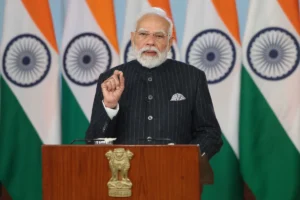
US lenders, including Citigroup Inc, JPMorgan Chase & Co, and Goldman Sachs Group Inc, rank among the largest employers in India’s global capability centres (GCCs), handling diverse operations such as trading support, risk management, and technological assistance.
Staffed by software engineers, quantitative analysts, and accounting professionals, these centres offer banks a low-cost, high-skilled workforce not readily available in their home countries.
While US President Donald Trump has sought to protect American jobs by tightening immigration and visa policies, particularly through changes to the H-1B visa programme, analysts suggest the new rules may prompt banks to deepen their presence in Indian technology hubs such as Mumbai, Bengaluru, and Hyderabad.
These cities already employ more than 1.9 million people in such roles.
“Unless new restrictions specifically limit offshoring, foreign banks will rely even more heavily on their Indian capability centres,” said Umesh Chhazzed, founder of recruitment firm Anlage Infotech, who has worked with US lenders for over 20 years.
Impact of H-1B Visa Changes
The H-1B visa programme is crucial to both the Indian and US technology sectors, enabling the movement of skilled workers across borders.
It is also widely used by financial services and consulting firms. In the US fiscal year ending September 2023, Indian-born workers accounted for 72.3% of all H-1B visa beneficiaries.
JPMorgan CEO Jamie Dimon described the new visa rules as unexpected in an interview with the Times of India, noting, “For us, visas matter because we move people around globally. The challenge is that the US still needs to remain an attractive destination.”
The bank intends to engage with policymakers to navigate the evolving landscape.
EY values India’s GCC market at $64 billion, with it growing annually by around 9.8% between 2019 and 2024.
The number of centres is expected to rise to approximately 2,500 by 2030, up from 1,700 today, and the market is projected to reach $110 billion.
US banks are among the sector’s largest employers, allowing them to strategically shift work to India as a way to circumvent visa restrictions.
Citigroup employs around 33,000 staff in India, Bank of America more than 27,000, and JPMorgan approximately 55,000.
“Banks will be recalibrating strategies for their global capability centres, with a likely shift of more jobs to India, adding new functions,” said Abizer Diwanji, founder of NeoStart Advisors LLP. “However, they will proceed cautiously amid ongoing uncertainties.”
Global Trends and Strategic Responses
A 2023 study in the Management Science journal found that when countries impose skilled immigration restrictions, firms often respond by hiring more employees abroad. The most globalised companies hire nearly one overseas employee for every visa application rejected.
JPMorgan’s Asia-Pacific head, Sjoerd Leenart, expressed relief that the new H-1B fee does not apply to current visa holders but acknowledged it was too early to fully gauge the impact.
Indian Commerce Minister Piyush Goyal recently stated that immigration issues, including H-1B visas, had not been a major topic in US-India trade talks.
Parvathy Tharamel, partner at law firm Trilegal, noted, “India is becoming the backbone of global capability centres for international banks, driving critical business, compliance, technology, and innovation. The new H-1B restrictions will accelerate this trend, shifting more cross-border technology and high-value roles to Indian hubs.”
While the US has imposed tariffs on India’s merchandise exports, the services sector remains exempt.
Recent diplomatic tensions over tariffs and oil purchases from Russia have complicated trade relations, although dialogue resumed following a call between Trump and Prime Minister Narendra Modi.
The move to tighten immigration policies introduces uncertainty, potentially tempering expansion plans.
Nonetheless, Indian GCCs are set to remain pivotal in the operations of US financial institutions, offering cost-effective access to global talent.
US banks continue to leverage India’s GCCs as strategic hubs, adapting to visa changes and geopolitical shifts while fostering the growth of India’s technology and financial services sectors.
Also Read: SAP India: Driving Scale, Innovation & Sovereign Cloud Solutions
To read more such news, download Bharat Express news apps





















